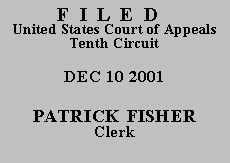

|
TONY MERLE LOVING,
v.
DEBBIE MAHAFFEY |
|
Before HENRY, BRISCOE, and MURPHY, Circuit Judges.
This case is before the court on Tony Loving's pro se request for a certificate of appealability ("COA"). Loving seeks a COA so that he can appeal the district court's dismissal of his 28 U.S.C. § 2254 habeas corpus petition. See 28 U.S.C. § 2253(c)(1)(A) (providing that no appeal may be taken from the denial or dismissal of a § 2254 petition unless the petitioner first obtains a COA). The district court dismissed Loving's petition on the ground that it was filed outside of the one-year limitations period set out in 28 U.S.C. § 2244(d). Because Loving has not shown "that jurists of reason would find it debatable whether the district court was correct in its procedural ruling," this court denies his request for a COA and dismisses the appeal. See Slack v. McDaniel, 529 U.S. 474, 484-85 (2000) (holding that when a district court dismisses a habeas petition on procedural grounds, a petitioner is entitled to a COA only if he shows both that reasonable jurists would find it debatable whether he had stated a valid constitutional claim and debatable whether the district court's procedural ruling was correct).
In his application for a COA and appellate brief, Loving does not contest the district court's conclusion that he filed his § 2254 petition well outside the one-year period set out in § 2244(d). Instead, he contends that he is entitled to equitable tolling, is actually innocent, and the application of § 2244(d) to his petition constitutes a suspension of the writ. These contentions are clearly without merit. Loving contends that he is entitled to equitable tolling because his attorney abandoned him and did not file a notice of appeal as requested. This court has made clear, however, that a necessary predicate to the availability of equitable tolling is that the petitioner has diligently pursued his claims. See Fisher v. Gibson, 262 F.3d 1135, 1143 (10th Cir. 2001); Miller v. Marr, 141 F.3d 976, 978 (10th Cir. 1998). Loving's appellate filings offer no explanation why it took him almost four years after his conviction became final to file his state petition for post-conviction relief and almost five years to file the instant § 2254 petition. Nor is that delay explained by Loving's attorney's failure to file a notice of appeal as allegedly directed by Loving. Because Loving has not diligently pursued his claims, he is not entitled to equitable tolling. Furthermore, Loving's conclusory claim of actual innocence, especially in light of his plea of guilty in open court, is insufficient to entitle him to equitable tolling. See Schlup v. Delo, 513 U.S. 298, 324 (1995) (holding that to be credible, a petitioner must support his allegations of innocence with "new reliable evidence--whether it be exculpatory scientific evidence, trustworthy eyewitness accounts, or critical physical evidence--that was not presented at trial"); Lasiter v. Thomas, 89 F.3d 699, 702 (10th Cir. 1996) ("Solemn declarations in open court carry a strong presumption of verity. The subsequent presentation of conclusory allegations unsupported by specifics is subject to summary dismissal . . . ."). For these same reasons, we conclude that the application of § 2244(d) to Loving's petition does not amount to a suspension of the writ. See Miller, 141 F.3d at 978 (holding that application of § 2244(d) does not amount to a suspension of the writ where petitioner's own lack of diligence caused his claims to be time-barred and petitioner has not made a colorable claim of actual innocence).
Loving has not demonstrated that the district court's dismissal of his petition pursuant to § 2244(d) is reasonably debatable. Accordingly, he is not entitled to a COA. See Slack, 120 S. Ct. at 484-85. For those reasons set out by the district court in its order of dismissal dated May 25, 2001, as well as those reasons set out above, this court DENIES Loving's request for a COA and DISMISSES this appeal.
ENTERED FOR THE COURT
Michael R. Murphy
Circuit Judge
*. This order and judgment is not binding precedent, except under the doctrines of law of the case, res judicata and collateral estoppel. The court generally disfavors the citation of orders and judgments; nevertheless, an order and judgment may be cited under the terms and conditions of 10th Cir. R. 36.3.